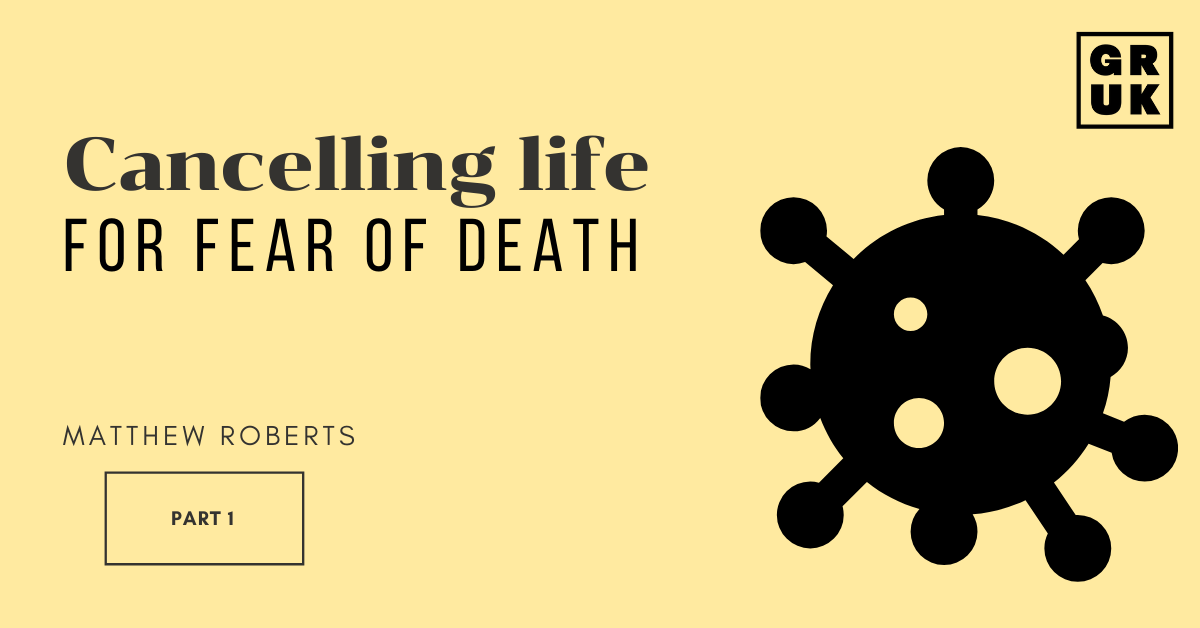Cancelling life for fear of death (3): Baptism
This is the third in a series of posts on the crippling fear of death exposed by Covid-19, and how it has led to the cancelling of some key ways Christianity offers hope and life in the face of death. You can read the first and second posts here and here.
‘… our Saviour Christ Jesus, who abolished death and brought life and immortality to light through the gospel.’ 2 Timothy 1:10
The tragedy of the many, many Covid deaths has been made far more heartwrenching by the fact that so many have died alone. As I said at the beginning of my first post, refusing to allow family to be with their dying relatives, for fear that they might catch the infection – denying the basic human need of the comforting presence of loved ones as life draws to a close – is one of the starkest demonstrations of how we have cancelled life for fear of death.
The Christian gospel offers a comfort in the face of death which is even greater and more precious than the squeeze of a loved one’s hand and their words of affection in our ears. Infinitely greater, in fact; for Jesus does not offer merely loving words and touch, precious as those things are. Jesus, in the words of the Apostle Paul, has abolished death.
And to make sure that neither the church nor the world could forget that, Jesus gave a dramatic sign and seal to mark the entry of any man, woman or child into his church: baptism.
When the UK government announced the closing of churches on March 18th, it was shortly afterwards specifically stated that baptisms were not permitted. Rather like with weddings, it seems that the government thought that it was banning baby-congratulation parties. But baptism is nothing to do with congratulations on the birth of a baby. It is the symbol of the new and eternal life which Jesus gives, now and beyond the grave.
At the first Easter Jesus Christ, the Son of God who became human flesh, defeated death by dying and rose triumphantly from the grave. Now he possesses an eternal, glorious life, a risen and transformed body which can never again be touched by death. And here is the good news: he shares his triumph over death with all who will receive it from him. Those who trust in Jesus will find that, far from being the grim and final dying of the light, death becomes merely the prelude to resurrection. On their deathbeds, Christians know that their journey to the grave will be a temporary visit. They will emerge, bodies and souls reunited, called forth by the voice of Christ, to share his glorious eternal life. What happened to Jesus on Easter Sunday will happen to them at his return. As the Book of Common Prayer puts it, Christians are buried ‘in the sure and certain hope of the resurrection to eternal life.’ Christianity has the one message on earth that brings real hope to the dying, for Christianity alone proclaims the defeat of death itself.
And it is this which baptism signifies. However much water is used, it is Easter reenacted: entering the grave and emerging the other side; buried in death, and then rising to a new life which death will never touch. For our sins, the root cause of death, have been dealt with, paid for, and washed clean by the death of Jesus Christ. The risen Jesus has poured his life-giving Spirit onto and into us. At every baptism Jesus announces that for this person the curse of death has already fallen, and already with Christ they have been raised to life eternal. Why should I, a Christian, be afraid of death? I have already died, years ago, in the waters of baptism; and death does not come twice. Jesus raised me then to eternal life by his Spirit. He will do the same to this failing body after it has been buried in the ground. ‘If the Spirit of him who raised Jesus from the dead dwells in you, he who raised Christ Jesus from the dead will also give life to your mortal bodies through his Spirit who dwells in you’ (Romans 8:11). The fact that we emerged to eternal life after our burial in the waters is God’s guarantee to all who trust Christ that we will emerge to eternal life after our burial in the ground.
This is the one true hope which a secular nation terrified of death so desperately needs. Countless Christians through the centuries have been willing to die rather than renounce their baptisms, because baptism is a seal of entry into a life which death has not the slightest power to touch.
And yet for fear of death, baptisms have been cancelled.
Permitting baptisms, with two socially-distant witnesses, would have had zero effect on the spread of the epidemic. Granted, baptism ought normally to be done in the presence of a congregation as part of the church’s worship; but this did not justify the government forbidding it. For fear of death, Jesus’ great symbolic announcement to the world that he has defeated death, and will defeat it finally for all who trust him, has been prevented from occurring in our country. The tragedy of this is unspeakable. A deadly epidemic is not the time to shove aside the only thing on earth that offers life beyond the grave. The government must permit baptisms, and the church must be willing to perform them. For Christ has abolished death.
Reposted from Matthew Robeters’ blog https://matthewpwroberts.wordpress.com/2020/06/10/cancelling-life-for-fear-of-death-3-baptism-and-the-defeat-of-death/
Matthew Roberts is the Minister of Trinity Church York, part of the International Presbyterian Church. http://trinitychurchyork.org.uk. You can find his musings on Twitter at @MPWRoberts.








